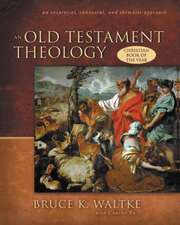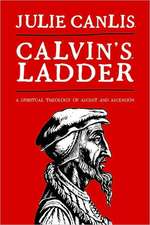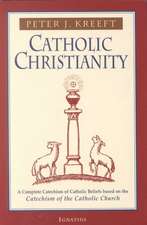I Want You to Be – On the God of Love
Autor Tomá Halík, Gerald Turneren Limba Engleză Hardback – 14 aug 2016
In his two previous books translated into English, Patience with God and Night of the Confessor, best-selling Czech author and theologian Tomáš Halík focused on the relationship between faith and hope. Now, in I Want You to Be, Halík examines the connection between faith and love, meditating on a statement attributed to St. Augustine—amo, volo ut sis, “I love you: I want you to be”—and its importance for contemporary Christian practice. Halík suggests that because God is not an object, love for him must be expressed through love of human beings. He calls for Christians to avoid isolating themselves from secular modernity and recommends instead that they embrace an active and loving engagement with nonbelievers through acts of servitude. At the same time, Halík critiques the drive for mere material success and suggests that love must become more than a private virtue in contemporary society. I Want You to Be considers the future of Western society, with its strong division between Christian and secular traditions, and recommends that Christians think of themselves as partners with nonbelievers. Halik’s distinctive style is to present profound insights on religious themes in an accessible way to a lay audience. As in previous books, this volume links spiritual and theological/philosophical topics with a tentative diagnosis of our times. This is theology written on one’s knees; Halik is as much a spiritual writer as a theologian. I Want You to Be will interest both general and scholarly readers interested in questions of secularism and Christianity in modern life.
"Tomáš Halík recovers the old insight of the church fathers that faith should be seen as a journey rather than a fixed dwelling. His meditation on this is full of fresh insights that renew old truths, and help us make surprising, biblical sense of our bafflement before the existential issues of faith. This is a book for our age." —Charles Taylor, emeritus, McGill University
"Seldom have I read a book that prompted me to think about the mystery of God's love in such surprising and delightful new ways. By turns profound, challenging, and unsettling, Tomáš Halík's new book is also a rarity in theological and spiritual discourse in that it is beautifully written, clearly articulated, and wonderfully inviting." —James Martin, S.J., author of Jesus: A Pilgrimage
"In this luminous book, Tomáš Halík embodies St. Paul’s description of love—as patient, as kind, as bearing and enduring all things—in providing wise and gentle accompaniment to all those, believers and nonbelievers alike, who are seekers of transcendence in our perplexing times. In his exploration of the meaning of love of God and love of one’s enemy, he mines insights not only from familiar figures such as Eckhart, Kierkegaard, and Levinas, but from surprising sources including Feuerbach, Marx, and Nietzsche. I Want You to Be adds to a body of work in which Halík has responded to Charles Taylor’s historical-sociological-philosophical analysis of our 'secular age' with his own penetrating theological, spiritual, and psychological diagnosis of the conditions of post-secularity." —William A. Barbieri, Catholic University of America
“Tomáš Halík is building a broad community of readers in Europe, between various religions, disciplines, cultures, and nations. He writes at a level higher than our best spiritual writers but does not write as an academic theologian despite the fact that he knows that kind of literature well. Halík's message of religious tolerance and understanding, against the background of European secularization, reflects a new voice for an American audience.” —Richard Rohr, O.F.M., Center for Action and Contemplation
"Tomáš Halík recovers the old insight of the church fathers that faith should be seen as a journey rather than a fixed dwelling. His meditation on this is full of fresh insights that renew old truths, and help us make surprising, biblical sense of our bafflement before the existential issues of faith. This is a book for our age." —Charles Taylor, emeritus, McGill University
"Seldom have I read a book that prompted me to think about the mystery of God's love in such surprising and delightful new ways. By turns profound, challenging, and unsettling, Tomáš Halík's new book is also a rarity in theological and spiritual discourse in that it is beautifully written, clearly articulated, and wonderfully inviting." —James Martin, S.J., author of Jesus: A Pilgrimage
"In this luminous book, Tomáš Halík embodies St. Paul’s description of love—as patient, as kind, as bearing and enduring all things—in providing wise and gentle accompaniment to all those, believers and nonbelievers alike, who are seekers of transcendence in our perplexing times. In his exploration of the meaning of love of God and love of one’s enemy, he mines insights not only from familiar figures such as Eckhart, Kierkegaard, and Levinas, but from surprising sources including Feuerbach, Marx, and Nietzsche. I Want You to Be adds to a body of work in which Halík has responded to Charles Taylor’s historical-sociological-philosophical analysis of our 'secular age' with his own penetrating theological, spiritual, and psychological diagnosis of the conditions of post-secularity." —William A. Barbieri, Catholic University of America
“Tomáš Halík is building a broad community of readers in Europe, between various religions, disciplines, cultures, and nations. He writes at a level higher than our best spiritual writers but does not write as an academic theologian despite the fact that he knows that kind of literature well. Halík's message of religious tolerance and understanding, against the background of European secularization, reflects a new voice for an American audience.” —Richard Rohr, O.F.M., Center for Action and Contemplation
| Toate formatele și edițiile | Preț | Express |
|---|---|---|
| Paperback (1) | 116.14 lei 3-5 săpt. | |
| Wiley – 30 oct 2019 | 116.14 lei 3-5 săpt. | |
| Hardback (1) | 170.51 lei 3-5 săpt. | |
| MR – University of Notre Dame Press – 14 aug 2016 | 170.51 lei 3-5 săpt. |
Preț: 170.51 lei
Nou
Puncte Express: 256
Preț estimativ în valută:
32.63€ • 33.94$ • 26.94£
32.63€ • 33.94$ • 26.94£
Carte disponibilă
Livrare economică 24 martie-07 aprilie
Preluare comenzi: 021 569.72.76
Specificații
ISBN-13: 9780268100728
ISBN-10: 0268100721
Pagini: 200
Dimensiuni: 146 x 223 x 20 mm
Greutate: 0.39 kg
Ediția:1
Editura: MR – University of Notre Dame Press
ISBN-10: 0268100721
Pagini: 200
Dimensiuni: 146 x 223 x 20 mm
Greutate: 0.39 kg
Ediția:1
Editura: MR – University of Notre Dame Press
Recenzii
"Tomáš Halík recovers the old insight of the church fathers that faith should be seen as a journey rather than a fixed dwelling. His meditation on this is full of fresh insights that renew old truths and help us make surprising, biblical sense of our bafflement before the existential issues of faith. This is a book for our age." —Charles Taylor, emeritus, McGill University
"Seldom have I read a book that prompted me to think about the mystery of God's love in such surprising and delightful new ways. By turns profound, challenging, and unsettling, Tomáš Halík's new book is also a rarity in theological and spiritual discourse in that it is beautifully written, clearly articulated, and wonderfully inviting." —James Martin, S.J., author of Jesus: A Pilgrimage
"In this luminous book, Tomáš Halík embodies St. Paul’s description of love—as patient, as kind, as bearing and enduring all things—in providing wise and gentle accompaniment to all those, believers and nonbelievers alike, who are seekers of transcendence in our perplexing times. In his exploration of the meaning of love of God and love of one’s enemy, he mines insights not only from familiar figures such as Eckhart, Kierkegaard, and Levinas, but from surprising sources including Feuerbach, Marx, and Nietzsche. I Want You to Be adds to a body of work in which Halík has responded to Charles Taylor’s historical-sociological-philosophical analysis of our 'secular age' with his own penetrating theological, spiritual, and psychological diagnosis of the conditions of post-secularity." —William A. Barbieri, Catholic University of America
“Tomáš Halík is building a broad community of readers in Europe, between various religions, disciplines, cultures, and nations. He writes at a level higher than our best spiritual writers but does not write as an academic theologian despite the fact that he knows that kind of literature well. Halík's message of religious tolerance and understanding, against the background of European secularization, reflects a new voice for an American audience.” —Richard Rohr, O.F.M., Center for Action and Contemplation
“I think of Tomáš Halík as I think of C.S. Lewis, Thomas Merton, and Henri Nouwen—a rare combination of intellect along with an uncommon commitment never to betray the gene that unites us all as children of God.” —Doris Donnelly, John Carroll University
"Fluently translated by Gerald Turner, Halík's book is a masterfully written meditation on love, the God of love, and the implications that the love of God has for the Christian life. Eschewing easy or simplistic answers to the questions it poses, it seeks to shake believers from complacency and to instill in them an attitude of greater openness to the world and to the God who is its ground of being." —Catholic Library World
"A one-time member of the Czech underground and advisor to Václav Havel, Halík explores the theological understandings of love, grounding his discussion in scholarship yet writing in a style that is accessible to nonspecialists. . . . With this important book Halík joins the conversation taken up by Charles Taylor in A Secular Age and Martha Nussbaum in Political Emotions: Why Love Matters for Justice. In addition to exploring the concept of love, Halík weaves important autobiographical elements that add personal depth to the conversation." —Choice
Notă biografică
Tomáš Halík worked as a psychotherapist during the Communist regime in Czechoslovakia and at the same time was active in the underground church as a secretly ordained Catholic priest. Since the fall of the regime, he has served as general secretary to the Czech Conference of Bishops and was an advisor to Václav Havel. He has lectured at many universities throughout the world and is currently a professor of philosophy and sociology at Charles University. His books, which are best sellers in his own country, have been translated into many languages and have received several literary prizes.
Extras
EXCERPT:
I address myself to those who seek the meaning of those words, whether they consider themselves believers (of whatever denomination, because I am sure that in all churches and religious groupings there are those who regard their faith not as “a possession” but as a method, an ongoing journey), almost-believers or erstwhile believers (who in the course of their lives have lost their former religious certainties for one reason or another), doubters and agnostics, or nonbelievers (because in the multifarious world of “nonbelievers” there are always those who don’t consider their unbelief a comfy bed at their life’s destination but are “people on a journey”). I address the people I meet around me every day who are simul fideles et infideles, believers and unbelievers at one and the same time. In other words, they are by no means religiously tone deaf: on their path of faith they know moments of God’s silence and their inner aridity; sometimes they lose their way and then find it again; they have unanswered questions and also experience moments of revolt. I address people who are obliged to call out again and again, like the man in the Gospel, “I believe; help my unbelief!” (From I Want You to Be: On the God of Love)
I address myself to those who seek the meaning of those words, whether they consider themselves believers (of whatever denomination, because I am sure that in all churches and religious groupings there are those who regard their faith not as “a possession” but as a method, an ongoing journey), almost-believers or erstwhile believers (who in the course of their lives have lost their former religious certainties for one reason or another), doubters and agnostics, or nonbelievers (because in the multifarious world of “nonbelievers” there are always those who don’t consider their unbelief a comfy bed at their life’s destination but are “people on a journey”). I address the people I meet around me every day who are simul fideles et infideles, believers and unbelievers at one and the same time. In other words, they are by no means religiously tone deaf: on their path of faith they know moments of God’s silence and their inner aridity; sometimes they lose their way and then find it again; they have unanswered questions and also experience moments of revolt. I address people who are obliged to call out again and again, like the man in the Gospel, “I believe; help my unbelief!” (From I Want You to Be: On the God of Love)
Descriere
In his two previous books translated into English, Patience with God and Night of the Confessor, best-selling Czech author and theologian Tomáš Halík focused on the relationship between faith and hope. Now, in I Want You to Be, Halík examines the connection between faith and love, meditating on a statement attributed to St. Augustine—amo, volo ut sis, “I love you: I want you to be”—and its importance for contemporary Christian practice. Halík suggests that because God is not an object, love for him must be expressed through love of human beings. He calls for Christians to avoid isolating themselves from secular modernity and recommends instead that they embrace an active and loving engagement with nonbelievers through acts of servitude. At the same time, Halík critiques the drive for mere material success and suggests that love must become more than a private virtue in contemporary society. I Want You to Be considers the future of Western society, with its strong division between Christian and secular traditions, and recommends that Christians think of themselves as partners with nonbelievers.









